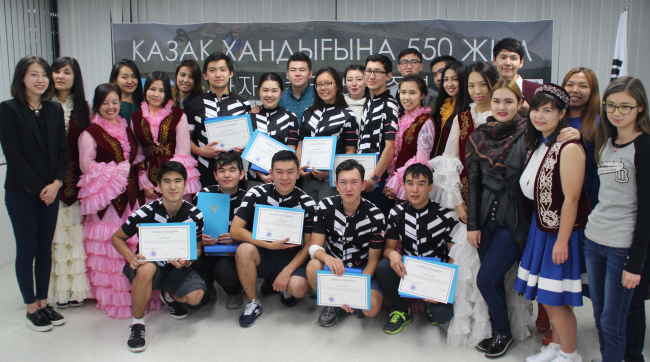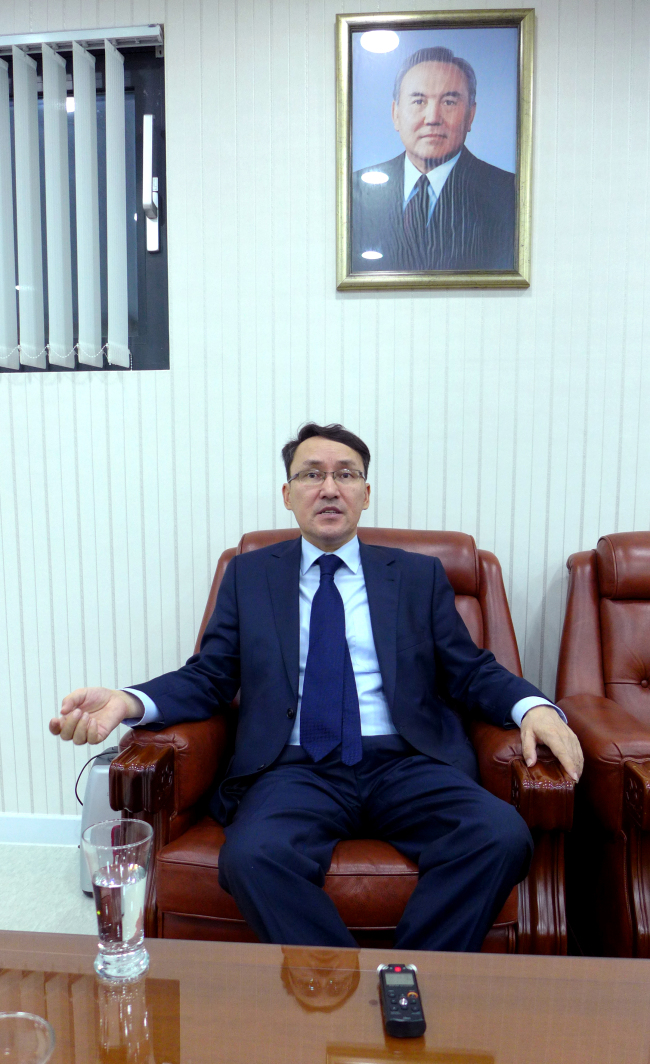Kazakh students mark national day with bicycle journey
By Korea HeraldPublished : Oct. 11, 2015 - 21:33
Kazakhstan celebrated 550 years of statehood this month in a series of pageantries across its vast territory covering Central Asia.
People wearing traditional costumes, with pointed fur hats, hunting eagles and stringed instruments, evoked images of their nomadic ancestors, who descended from Genghis Khan.
Starting from 1465, the migratory tribes were united by Sultans Kerey and Zhanibek and settled in the valleys of rivers Shu and Talas, forming the first “khanate,” according to historic records.
Kazakhstan, meaning “the land of Kazakhs,” became integrated into the Russian Empire from the 18th century onward, and formed an “autonomous republic” of the Soviet Union in 1936.
The country gained independence in 1991, and has since become a regional powerhouse, connecting Europe and Asia through diplomatic accords, trade routes and human networks.
People wearing traditional costumes, with pointed fur hats, hunting eagles and stringed instruments, evoked images of their nomadic ancestors, who descended from Genghis Khan.
Starting from 1465, the migratory tribes were united by Sultans Kerey and Zhanibek and settled in the valleys of rivers Shu and Talas, forming the first “khanate,” according to historic records.
Kazakhstan, meaning “the land of Kazakhs,” became integrated into the Russian Empire from the 18th century onward, and formed an “autonomous republic” of the Soviet Union in 1936.
The country gained independence in 1991, and has since become a regional powerhouse, connecting Europe and Asia through diplomatic accords, trade routes and human networks.

Ten Kazakh students at Korean universities took part in a cycling journey last week across the country to commemorate the milestone and engage in a cross-cultural dialogue with Koreans.
“We rested eight hours a day and rode the rest,” said Yeldos Kyrgyzbay, 21, a student at Kookmin University, in an interview with The Korea Herald. “To save time, we also rode on the outer lane of the highway, where cars zipped past us at over 100 kilometers per hour.”
The students traveled from Seoul to Daejeon and back from Oct. 7-9, covering 550 kilometers, coinciding with the genealogical years. The trip was organized by the Kazakh Student Association in Korea under the initiative of president Guldana Sakiyeva, 19, who studies at Korea University.
Kyrgyzbay said that his group, wearing uniforms bearing the label “EXPO Astana 2017,” told Korean passersby about Kazakhstan’s history, economy and lifestyle during breaks every 20 kilometers. “We were surprised to find that Koreans knew much more about Kazakhstan than we expected, compared to most Europeans.”
Kanat Dauletov, 22, a student at Korea University said that in Suwon, Osan, Cheonan and Sejong City along the way, their friends provided lodging in their small dormitory rooms and goshiwon ― tight, low-cost housing.
“We were struck by the beauty of Korea’s nature ― rice paddies, mountains and rivers,” Dauletov said. “It was a landscape we had never seen before studying on campus and hanging out in cities.”

According to the Astana Times, the notion of Kazakh nation-state incorporates the “people of Kazahkstan” ― Kazakhs, Slavic and Turkic groups, Asians and other Caucasians ― and the “indigenous land” that roughly overlaps the current territory.
Citing the Russian Empire’s 1897 census, the Times noted that ethnic Kazakhs who had long lived in the khanate were met by waves of immigration from the early 20th century, leading to a multicultural society.
Today, more than 130 nationalities ― Kazakh, Russian, Uzbek, Ukrainian, Tatar, Uyghur, German, Azeri, Belarusian and ethnic Koreans ― live harmoniously in “the Land of the Great Steppe.”
“The hardships of forced Soviet collectivization, war efforts against Nazi Germany, postwar reconstruction, breakup of the Soviet Union and difficult adaptation to free market economy,” the media outlet said, “brought people of different ethnicities closer together, strengthening tolerance and the need for understanding and solidarity.”
This view was echoed by Kazakh Ambassador Dulat Bakishev, who stressed that his government did not give more rights to one group over others.
“Although Kazakhstan is largely a Muslim country with 70 percent of population practicing Islam,” he said, “we have sizable minority faiths ― Christians, Jews and Buddhists ― who celebrate their indigenous traditions alongside national holidays, such as the 550th khanate anniversary.”
Bakishev also credited ethnic Koreans ― “goryoins” ― who settled in Kazakhstan in the 1930s following Soviet purge, for bridging the two countries. “Koreans are known to be dynamic and diligent, and their presence has increased over the years,” he said, referring to over 8,000 Koreans working and living in Kazakhstan.

Regarding relations with Korea, Bakishev said that Astana and Seoul were expanding their strategic partnership, noting that Korea’s “Eurasia Initiative” foreign policy and Kazakhstan’s policies in intercontinental energy, transport and logistics routes would harmonize in practice.
“Kazakhstan is situated at the center of Eurasia and we are a significant player in energy with rich productions of oil and gas, coal and uranium” the ambassador underscored. “We also connect East Asia, Europe, the Caucasus and the Middle East through our advanced railways and other transport and logistics infrastructures.”
Kazakhstan will host the 2017 International Expo in capital Astana under the theme of sustainable energy, showcasing innovative and practical solutions to global energy problems and climate change.
Regarding the country’s democratic development, the diplomat said that Astana has been steadily transitioning to sustainable politics, business practices and social welfare.
“Korea knows firsthand the difficulties it faced in moving from a military dictatorship to a vibrant democracy,” he said, adding that his government was studying Korea’s development experience while solidifying its economic foundations.
“Although democracy has institutional similarities, our future political system will consider our unique historic experiences and cultural factors,” he added. “It will be a ‘Kazakhstani democracy,’ which is not a distant future, but an ongoing process that our people have been actively engaging.”
By Joel Lee (joel@heraldcorp.com)
-
Articles by Korea Herald








![[Graphic News] More Koreans say they plan long-distance trips this year](http://res.heraldm.com/phpwas/restmb_idxmake.php?idx=644&simg=/content/image/2024/04/17/20240417050828_0.gif&u=)
![[KH Explains] Hyundai's full hybrid edge to pay off amid slow transition to pure EVs](http://res.heraldm.com/phpwas/restmb_idxmake.php?idx=644&simg=/content/image/2024/04/18/20240418050645_0.jpg&u=20240419100350)






![[From the Scene] Monks, Buddhists hail return of remains of Buddhas](http://res.heraldm.com/phpwas/restmb_idxmake.php?idx=652&simg=/content/image/2024/04/19/20240419050617_0.jpg&u=20240419175937)

![[KH Explains] Hyundai's full hybrid edge to pay off amid slow transition to pure EVs](http://res.heraldm.com/phpwas/restmb_idxmake.php?idx=652&simg=/content/image/2024/04/18/20240418050645_0.jpg&u=20240419100350)

![[Today’s K-pop] Illit drops debut single remix](http://res.heraldm.com/phpwas/restmb_idxmake.php?idx=642&simg=/content/image/2024/04/19/20240419050612_0.jpg&u=)